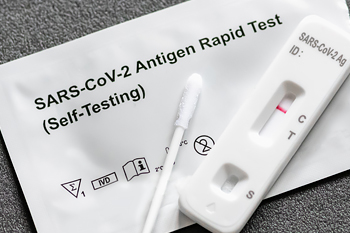HR expert Rob Wilson explains how COVID continues to challenge HR guidelines
 Accessible and accurate COVID testing is a crucial part of our return to the ‘new normal,’ particularly when it comes to getting employees back to work. This is especially true when it comes to businesses which haven’t yet required the COVID vaccine, and instead will accept negative COVID test results from unvaccinated staff.
Accessible and accurate COVID testing is a crucial part of our return to the ‘new normal,’ particularly when it comes to getting employees back to work. This is especially true when it comes to businesses which haven’t yet required the COVID vaccine, and instead will accept negative COVID test results from unvaccinated staff.
“One way that many human resource departments have navigated the challenging and divisive issue of vaccine mandates is by accepting negative COVID results in their stead. But as many cities in America are grappling with COVID testing shortages, this stopgap is no longer a viable solution, especially as even fully vaccinated people are now getting the new strain of the virus and the CDC has said that fully vaxxed Americans are still spreading Omicron,” says Rob Wilson, President of Employco USA, a nationwide employment solutions firm with clients across the country.
“And, the surge in COVID testing means that results are taking longer than before, especially without adequate lab staffing. So even if your employees CAN get tested quickly, they may be waiting days for the results.”
In the meantime, says Wilson, companies are forced to deal with missing employees who can’t come back to the office without negative results.
“Whether an employee says they have a sore throat or a headache, or they fear that they may have been exposed to the virus via family members or people they were in close contact with, there is nothing an HR department can do but continue waiting for the employee to have negative results,” says Wilson. “But in the meantime, many employers fear that people may be using false COVID symptoms as a way to get sick leave without repercussions.”
Wilson points to a Florida deputy who was recently arrested after it was found she was faking COVID and raking in weeks of paid sick leave.
“Everyone is overwhelmed and stressed out right now. Getting back to work in January after the holidays is always difficult, and it’s no wonder that some employers fear that their workers may be using COVID as a ‘get out of jail free’ card when it comes to returning to normal work hours,” says Wilson. “Many offices set January 2022 as their ‘return to the office’ date, and the rising cases of Omicron have given employees plenty of wiggle room to resist the shift back to in-person employment.”
So, what does the human resources expert advise employers and HR managers to do?
“Be flexible. Be willing to pivot. If you can’t get your hands on COVID tests at the moment from drugstores or other sources, don’t panic and start buying whatever tests you can find online. There are many fake COVID tests being sold online, and getting false negatives or positives will only put your bottom line at bigger risk,” says Wilson. “Be prepared for January and February to look much different than you planned. The grand return to the office may need to look a little less grand than you wished. For instance, maybe you keep your workers in ‘pods’ and have different pods come in on different days to limit exposure.”
Wilson also says that since COVID tests may not be available right now, focus your HR funds on N95 and KN95 masks.
“The CDC is expected to say that these masks are much more effective in preventing COVID and that cloth masks are not a good way to stop the spread,” says Wilson. “Keeping this in mind, HR departments need to consider whether they will ban cloth masks from the workplace and require these N95 type of masks. If so, how will the masks be purchased? How many for each employee? How many uses can you get out of one mask? These are all important questions to consider moving forward.”
Wilson also says that now is the time to tighten up your vaccine mandates if you have not already.
“It’s time to revisit the verbiage of your vaccine mandate, if you have one in place for your employees. You may want to shift the language so that it is clear that ‘fully vaccinated’ means an employee who has gotten the first 2 shots, as well as this booster and any future boosters,” says Wilson. “If you have been resisting a mandate for fear of upsetting your employees, it’s becoming clear that employers can’t continue using negative testing as a stopgap. Testing will only become harder to access and results more difficult to obtain as we move into the winter months of cold/flu season.”
For more on this topic, please contact Rob Wilson at rwilson@thewilsoncompanies.com.